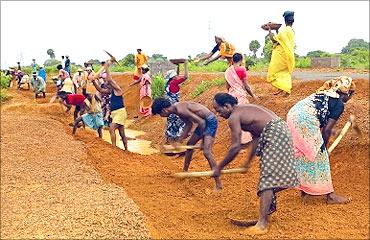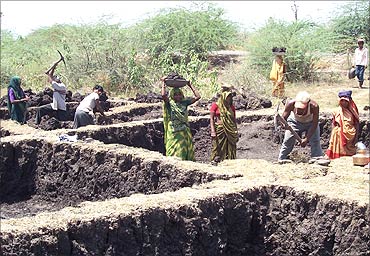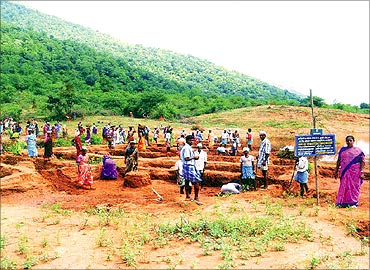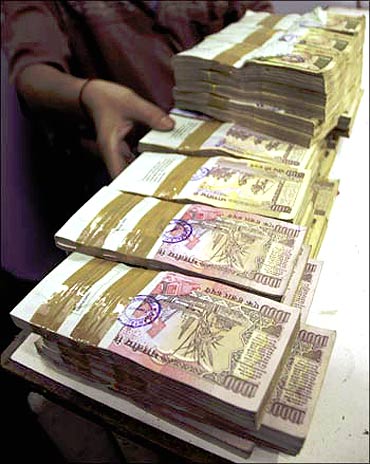Sanjeeb Mukherji and Sreelatha Menon in New Delhi
It is back to the 1970s as far as the National Rural Employment Guarantee Scheme is concerned.
The job guarantee scheme is set to provide food grain as part of wages.
The rural development ministry, which found its NREGA (National Rural Employment Guarantee Act) allocations squeezed in the Budget, has approached the food ministry with a proposal to provide food for work under the scheme.
The scheme, which guarantees 100 days of work on demand to any rural citizen, had a budget of about Rs 40,000 crore (Rs 400 billion) till last year.
It found its allocation almost halved in this year's Budget.
. . .
Job scheme to provide food, too
Undeterred, the ministry has decided to explore the provision in the Act that provides for payment of up to 25 per cent wages in kind.
The food ministry has readily agreed to the move, which could also address the situation of surplus grain stocks and malnutrition existing together.
Food minister K V Thomas told Business Standard that he was all for NREGA paying grain for work.
"Why not?
"We have a surplus and we have already exported 43 lakh tonnes of rice and about seven lakh tonnes of wheat.
"We have almost thrice the amount needed to keep as buffer stock,'' he said.
. . .
Job scheme to provide food, too
Image: Jairam Ramesh.He said he had discussed the matter with rural development minister Jairam Ramesh and the officials on both sides would work out a scheme for providing food grain under NREGA.
Ramesh did not respond to queries on the subject.
Schedule 2 of the Act says, "The wages under a scheme may be paid either wholly in cash or in cash and kind provided that at least one-fourth of the wages shall be paid in cash only."
The Food for Work programme implemented as a drought relief measure in the 70s was formalised into a centrally sponsored programme under the Sampoorna Grameen Rojgar Yojana in 2001 by the then BJP-led government.
. . .
Job scheme to provide food, too
Under the scheme, five million tonnes of food grain worth Rs 5,000 crore (Rs 50 billion) were to be provided to wage workers in all states.
The scheme was later morphed into NREGA, when a right to work law was passed to provide 100 days of guaranteed wage employment to any rural applicant.
While wages were provided in cash, the law has a provision for supplementing cash with food grain to the extent of 25 per cent, according to Nikhil De, member of the Employment Guarantee Council and activist of the Rajasthan-based Mazdoor Kisan Shakti Sanghatan.
De, also a member of the Planning Commission steering committee on NREGA, which recently criticised the scheme's failure to provide either employment or wages, welcomed the proposal to supplement cash payment with food grain.
. . .
Job scheme to provide food, too
"Women would any day prefer food grains to money, for that would guarantee food security," De said.
The success of the proposal would depend on the price at which the grains were offered, he said.
Ideally, it should be close to the BPL price or people would prefer to get their food grains from the market rather than work to get it as wages, De said.
K S Gopal, a researcher at Tata Institute of Social Sciences who has been critical of Ramesh on NREGA reforms, welcomed the move and said he had always favoured part-payment in foodgrain.
. . .
Job scheme to provide food, too
"If people get food for work, then they would have the confidence to negotiate the economy.
Besides, people won't steal food the way they do cash. The government can't delay payments as grains would rot, unlike cash," he said.
"The only precaution should be against paying in bulk for several months for then people would just sell it," he said.
The move would be a boon for the food ministry.
The Food Corporation of India, as on March 6, had around 54 million tonnes of grains in the central pool, a staggering 158 per cent more than required under the buffer and strategic norms.
Attempts to dispense with some of the excess stock through additional allocation to states to the tune of around 26.5 million tonnes have not borne fruit because of the additional subsidy burden it would entail.








article